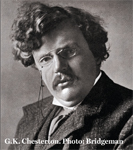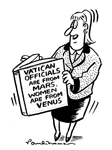The Pope has urged the Catholic Church to be a field hospital, healing people’s wounds. His remark could easily be applied to the work being done in parts of the developing world – work which is often not acknowledged because of its controversial nature. Much of that controversy is down to the continuing conflicts in the Church about women
Pope Francis claims that the Church lacks “a deep theology of woman”. This is only partially true. Since the Second Vatican Council, Catholic women theologians from all continents have been reflecting on women’s lives in the spirit of the council, but these theologies have yet to find official acceptance. On the other hand, “theology of the body”, inspired by Pope John Paul II’s catechesis on the book of
12 October 2013, The Tablet
Theology that hears the poor
Catholicism and women
Get Instant Access
Continue Reading
Register for free to read this article in full
Subscribe for unlimited access
From just £30 quarterly
Complete access to all Tablet website content including all premium content.
The full weekly edition in print and digital including our 179 years archive.
PDF version to view on iPad, iPhone or computer.
Already a subscriber? Login





User Comments (4)
Fear of change or admitting error is the Achille's heel of the Vatican.
During the 1966 Papal Birth Control Commission, at which Chicago Catholics and co-directors of the Christian Family Movement, Patty & Pat Crowley were members, a heated discussion about how the church could save face if it were to allow couples to decide how to limit offspring.
Marcelino Zalba, a Spanish Jesuit member of the commission, asked, “What then with the millions we have sent to hell” if the rules are relaxed? Patty immediately responded in what became perhaps her most memorable quote. “Fr. Zalba,” she said, “do you really believe God has carried out all your orders?”
In the end, the commission recommended overwhelmingly that the strict prohibition against contraception should be lifted, and a belatedly summoned “overseer” commission of cardinals and bishops concurred with the decision. “I don’t think there was a doubt in any of our minds that the pope would follow the commission report,” Patty said at the time. But after a two-year wait Paul VI issued the encyclical Humanae Vitae, which flatly rejected the commission report and declared the prohibition would remain in force.
See also: http://www.natcath.org/NCR_Online/archives2/2005d/120905/120905o.php
The promulgation of Humanae Vitae by Paul VI in 1968 gave rise to a significant fault line in the Church during the early post-conciliar years.
After setting up a Commission to consider the issue, the pope, under pressure from conservative elements in Rome, rejected its conclusion.
So did a multitude of Catholics world-wide reject his teaching, and they have continued to do so.
The lasting consequence of 1968 has been a conscientious decision by many to ignore the papal document as a statement of faith.
At the time many priests felt unable to adhere to its teaching and incurred the wrath of their bishops as a result.
The aftershocks have been felt through subsequent years.
But we are all pilgrims in a pilgrim church and so we journey on, trusting the Lord will meet the needs of his people
'Surveys have shown that large numbers of practising Catholics ignore the Church’s teaching on contraception, and remarriage'. Is Michael Phelan suggesting that because Church teaching is ignored it should be changed?
Surveys consistently show capital punishment is supported by significant majorities. Should the Church's teaching in relation to the death penalty change to reflect popular opinion - rather than the views of 'celibate bishops and clergy', whom Mr Phelan seems to hold in some disdain? I sincerely pray to God that 'popular opinion' does not prevail in this matter.
Our Saviour taught us that spreading the Good News is not like entering a public popularity contest, quite the contrary at times: 'Blessed are ye when they shall revile you, and persecute you, and speak all that is evil against you, untruly, for my sake'. (Matt. 5:11)
Humane Vitae is a wonderful document and guide for married couples. The problem is its context has never been articulated to the laity. Even as we speak today many newly weds have no idea what this document is all about. I want to disagree with what has been alluded to in this article that Humane vitae was not “received” fully by the laity. How can they receive something they are not aware about? Surveys have shown that large numbers of practising Catholics ignore the Church’s teaching on contraception - this is interpreted by the laity as a rule. While the laity is very aware that Church promotes Natural family Planning, for those who would like to practice the big question is where can I access? How has the church invested to ensure that these services are widely available to the laity? Majority of married couples are using contraceotives out of frustration and lack of no alternative. Human Vitaes context in relation to human life and conjugal must be well understood to be appreciated. There is a huge void and no wonder weak families, push for approval of divorce and remarriage.